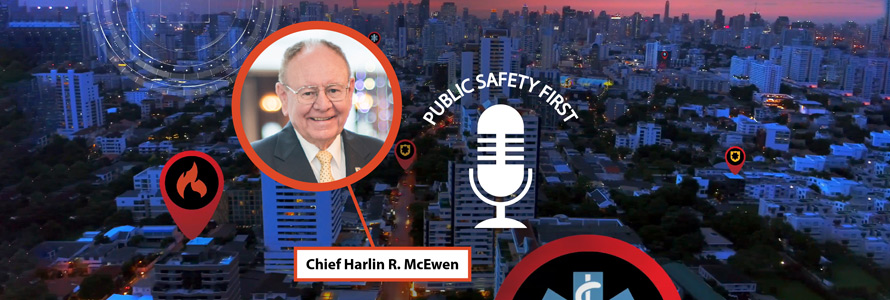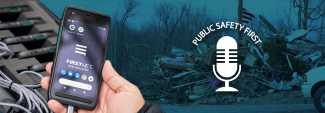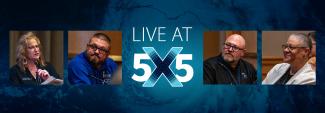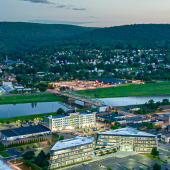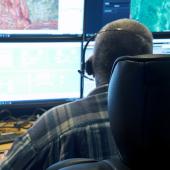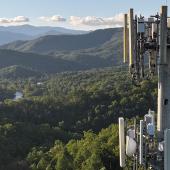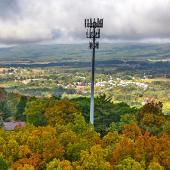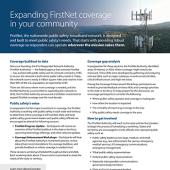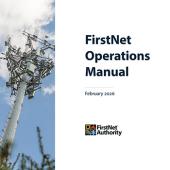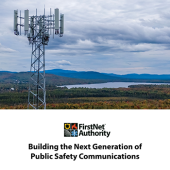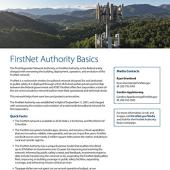Summary
Nine years after the passage of the legislation that created FirstNet, retired Police Chief Harlin McEwen reflects on the evolution of FirstNet and how the network is benefiting first responders today. Harlin also talks about the future of FirstNet and how new technologies, such as high-powered user equipment and Z-axis features, are “game changers” for public safety.
Guest
Ed Parkinson
FirstNet Authority CEO
Harlin McEwen
Retired Police Chief and Former FirstNet Authority Public Safety Advisory Committee Chair
Transcript
Preview
Narrator: You're listening to Public Safety First, a podcast to help you learn about the First Responder Network Authority and how you can be part of the future of public safety technology.
And now, your host.
Narrator: You're listening to Public Safety First, a podcast to help you learn about the First Responder Network Authority and how you can be part of the future of public safety technology.
And now, your host.
Ed Parkinson: Welcome to the Public Safety First podcast. I'm Ed Parkinson, the CEO of the First Responder Network Authority. Today, I'm honored to be joined once again by retired Chief Harlin McEwen, a true leader in the public safety community and considered to be the founding father of FirstNet. Certainly I am one of those true believers. Harlin's extensive career in law enforcement included leading two law enforcement agencies in New York and later serving as a Deputy Assistant Director of the FBI. Harlin was the chair of the IACP's [International Association of Chiefs of Police] Communications and Technology Committee for nearly 40 years and served as the first chair of the FirstNet PSAC [Public Safety Advisory Committee], a key leader in the fight to bring the reallocation of the D-block to public safety and ultimately the creation of FirstNet, which, as many of you remember was on February 22nd, 2012, which was just a little over nine years ago as we record this podcast. So, Harlin, it's terrific to see you again, my friend. It's been a little over two years since we've last done this. I think our last podcast was on December 2018.
Harlin McEwen: Yes, Ed. It's great to talk with you again.
Ed Parkinson: Well, let's just dive straight in. As I mentioned, we've just celebrated the ninth anniversary of the signing of the legislation that you were so instrumental, along with many others, in ensuring the passage of the FirstNet statute. And you were there at the start of it all. I remember some of the conversations that we had back when public safety was lobbying for the spectrum. The community of public safety really came together to create this legislation. And now here we sit nine years later. Could you give me a reflection on where we thought we may be versus where we are, really, today?
Harlin McEwen: Well, let me just spend a couple of minutes talking about the beginning. Like you said, I've been there from the beginning. In some cases, long before most of the people who got involved in the final report to get the legislation passed. The starting point for most of this happened, as you may recall, with a meeting that was held with the various commercial carriers in attendance, where they all said they would never give public safety priority on their networks. That statement by the major carriers was the straw that broke the camel's back when public safety said, "We have to do something because if they're not willing to work with us, we have to do something different." And so that began the effort by public safety. Started, first of all, with all of the major public safety organizations, the IACP, the fire chiefs, Major City Chiefs, the sheriffs, the EMS officials getting together. Then we moved to get the big seven—you know, the National Governors, the Conference of Mayors, Association of Counties and so on, all of the big national government organizations. Then we moved to Congress to get bipartisan support. That wasn't easy, but eventually we got the bipartisan support. And then the last piece of the puzzle was to get the president to the administration to agree to sign a bill if it was passed. And the current president, then Vice President Biden was instrumental in convincing the president, then Obama, to sign that legislation. So, all of that is important for those people who are just now starting to pay attention to what's going on.
The other part of it is that the FirstNet Authority, of which you are now the CEO, and that's wonderful in my view, because you understand public safety. You've been there. You were in the House at the time we were discussing the legislation and you've been with us from the very beginning. In addition, you have a wonderful staff supporting you and we have a great FirstNet Authority Board of Directors, which has changed, of course, over the years since the legislation was passed. And then there were government representatives and industry reps that came to our aid and continue to participate today. So, all of that as the foundation for this, the success of this program is important to mention.
Ed Parkinson: And what's also, I think, important, too, Harlin, is there were people and organizations that played key roles along the way. And then they played their part and were able, then, to step back and let others come in. I think that's just indicative of public safety. It's not so much about who gains the credit. It's about the mission and the mission of getting this program over the line, which you've seen from front to, front to where we are now.
Harlin McEwen: Yeah, well, there were lots of doubters. You know that public safety, when it comes together and collaborates like with the Big Seven and others, you know, eventually they're going to succeed. You know, it takes a long time to get Congress to do anything. But when you're persistent, it happens. So, I just want to make mention of that and then to answer your question about, you know, my reflection over the advances of the past nine years. I mean, it's been phenomenal. The support of all those people that I just mentioned in getting it going and continuing to support it has been absolutely essential. The technology over the last nine or 10 years has evolved. Just the developments of wireless broadband and the various smartphone technologies, devices that have come to fruition. It's just, it's just phenomenal. You know, we had the vision for a lot of this, but really never, never expected the kinds of advances and good things to come out that have, that have happened in this time period.
Ed Parkinson: I think that's a really good point you make there, Harlin, because it's really the art of the possible, is it not? We see these incredible tools that exist in the private sector, in our commercial lives and our private lives day to day. But to see them now being accessible to public safety, things like compact rapid deployables, FirstNet push-to-talk, FirstNet MegaRange, Z-axis solutions. You know, these are just solutions that have just come out in the last month or two at FirstNet. Yet these are world firsts and I think that's so exciting. Give me your reaction on the progress we're making in these areas and where you hope to see these go in the future.
Harlin McEwen: Well, these announcements that came out of AT&T are really exciting to me. The Z-axis solution, the whole issue of being able to find not only the public when we need to find them in an emergency, but our public safety personnel, police, fire, EMS personnel, if they're, you know, say, trapped in a building, particularly for fire service, if they're fighting a fire inside of a building and they get disoriented and they can't find their way out, it's critical that the command structure on the street is able to get into the building and find them with some kind of expertise. And this is something that we've been talking about a long time. The fact that now you, the FirstNet Authority and AT&T, has come together to offer this solution is really wonderful. I mean, it's a big deal and it also applies to law enforcement and situational awareness where we need to know where personnel are when we're dealing with a major event. The FirstNet MegaRange, high powered user equipment [HPUE]. I'm personally engaged in that I have installed in my personal vehicle a Sierra wireless router. I have a new Airgain high powered user equipment, MegaRange antenna and device. And I'm doing tracking now in my home area so I can, for instance, my device has both FirstNet and, you know, one of the other commercial carriers. And I can track the difference in coverage. I can see where the high powered devices have a major impact in the rural areas. But all of these developments are wonderful.
Ed Parkinson: There are so many benefits to be able to extend one's range, especially in rural areas when one considers the, just the topography of the United States. You think about the challenges they face with very rural and wilderness areas are just that much greater in certain circumstances and very different to those in urban areas. So, give me a little bit of a sense in terms of the vision you have for HPUEs, especially in rural communities and those where it's difficult to deploy regular radio access networks [RAN]?
Harlin McEwen: Well, first of all, I think it's important to make clear that no network, including FirstNet built by AT&T, will ever cover every inch of the terrestrial ground in the country. I mean, there are areas in the West, in the Rocky Mountains and the deserts and other places where there will never be terrestrial coverage. And so we have to recognize that. What we're looking at, though, is how to extend the terrestrial coverage that FirstNet offers in the rural areas. In my area, we have what we call hills. They prevent us from getting coverage in certain areas. They're quite different than the mountains in the Rockies and so on. But, in my primarily rural county, the HPUE extends not only the Band 14 coverage, but it extends just the normal AT&T coverage that AT&T has offered to public safety in addition to Band 14. It's exciting because I've been working with one of our local ambulance services where they do a run pretty regularly from Ithaca, New York, to Sayre, Pennsylvania, to a trauma center at the Robert Packer Hospital and there were quite a few dead spots between Ithaca and Sayre. And so we tested the various networks and found that there were gaps. When you add the FirstNet HPUE MegaRange HPUE to it, it almost totally eliminates those gaps. I mean, I think it was less than a mile of gap on a 41-mile trip.
Ed Parkinson: Frankly, the, this is just the beginning, right? And I think that's the wonderful part of all the solution sets that we just talked about this. It's the same with any sort of "version one" right? There are the little changes one has to make in time and version two, version three will only get better and better. And ultimately, I think that'll be tremendous to see that kind of growth and that kind of improvement for public safety.
Harlin McEwen: It's important for me to mention, Ed, the fact that you and the FirstNet Board and AT&T have been, investing in a major sort of way in expanding the coverage of the FirstNet network in the country. This has been phenomenal.
Ed Parkinson: That's great to hear, Harlin. I know we've just recently talked a little bit about, publicly, you know, FirstNet now covers 2.71 million square miles and more to come. You know, we have a 25-year contract with AT&T. We're looking to expand coverage, not only through traditional RAN deployment, but also leveraging technologies like HPUE, leveraging technologies like deployables. So, I think that the future is bright for public safety. And the key part of that is public safety involvement. I think what's clear about the FirstNet system and how it differentiates itself from others is public safety is at the heart of every decision making that the Authority does. When we think about investments, we pull those investment ideas from public safety. Our PSAC has done a tremendous job at really identifying key areas that need attention by the Authority. Our Roadmap focuses on six core domains and each of those is shaped and crafted by public safety. So, I think to your point earlier about the differentiation that our network is starting to make in the lives of the women and men out there who serve, it's their involvement that is going to make their network even stronger.
Harlin McEwen: Yeah, I would agree. You mentioned the PSAC, and the fact is that the PSAC has served an important role in how this is all developed. As you know, when I was appointed the chair of the PSAC back in the fall of 2012, it was left to me to recommend how the PSAC might be organized and function. And my recommendation, which was followed, was to have a very broad group of individuals, not only from public safety, but from local, state and federal government, from industry, that represented a cross-section of people to give the FirstNet Authority staff and the Board our best advice on things that public safety needed and wanted. And I'm pleased that most of this was followed almost to the tee. It was instrumental in the development of the RFP [request for proposals] that eventually ended up in the contract awarded to AT&T.
Ed Parkinson: I learned my lesson years ago, Harlin, that whenever you speak, everyone should listen. So, yeah, a point well taken. That's, I think, fundamental again, to the success of the program. We don't pretend to know it all. Quite the opposite. We know that, while we have the huge responsibility that Congress gave us, that frankly, that public safety has entrusted to us to ensure that their network is deployed in the way that they can respond to the evolving challenges that public safety face every day. We have to have public safety involvement in the creation of the network. And, you know, I think that's replicated and you mentioned the RFP, you mentioned the development of the RFP. And, you know, that's 2013, 2014. And here we now sit in 2021.There's a lot of amazing opportunities for public safety communications in the future. What's your vision? Where do you see things going?
Harlin McEwen: it's a little bit difficult to project or predict what's going to happen in the future. I mean, I've watched what's gone on here over the last 20, 30 years in the development of technology. And as I look back upon it, it's just amazing the kinds of things that have happened during that period of time. But it's clear to me that 5G is going to be important in the future. I may say something different a few years from now, but I think 5G will mostly be important in the more urban areas where we can get faster throughput and more reliable service. But I think what you are planning now, what the FirstNet Authority is doing with AT&T to develop a future strategy is, is critical to the way this goes in the future. When the contract was awarded, one of the main elements to the contract was that not only would AT&T implement the network, but they would expand it and they would keep it fresh and that's one of the things that public safety has never been able to do in land mobile. We've never had the financial ability to keep networks up to speed with the technology advancements within this setting. The fact is that AT&T has demonstrated, with your support, that they are refreshing this network as they go. So, we're not just sitting on, you know, last year's technology. Every year we're continuing to implement new stuff, which is very exciting to me.
Ed Parkinson: Harlin, it's a really good point, and I think what's fascinating about the entire program, the commitment that AT&T has made, their ability to, frankly, put their brand on the line, they've stepped up for public safety. It's been remarkable to see the commitment from the entire team at AT&T is visible. And while they certainly deserve to be applauded, it's also important for public safety to remember that we, the Authority, are here to hold AT&T accountable. We have this 25-year contract with AT&T and that does give this public-private partnership a lot more merit, I think, than what other carriers are able to offer. My organization, we're not here for any other reason other than public safety. I think that's key. Don't you agree?
Harlin McEwen: I do. The way this was legislated, what we have now is we have a federal authority which clearly have that oversight responsibility. And, to me, that's the differentiation between the FirstNet network and other commercial networks. I mean, they have no such mandate. They can do whatever they want. They can offer what they want. They can offer today, take it away tomorrow. The fact is that you have the authority as the oversight group to make sure that AT&T fulfills the contract and measures up to what we want.
Ed Parkinson: We're only four years into a 25-year contract. Things will only get better and service will get better. We're excited for the future of 5G. We're going to be ready for it. And we're going to be excited to offer new services, devices, applications across the ecosystem to public safety. So, it's a very exciting phase of the project. And, you know, I'm certainly pleased that you're going to be part of it going forward, Harlin.
Harlin McEwen: Well, it is exciting to you and to me and to many people in public safety. I mean, just, it's just as I said in the very beginning of this discussion, the progress has been phenomenal. And we said we needed our own single nationwide public safety broadband network. And that is exactly what you and AT&T are delivering. And it's just way beyond my expectations.
Ed Parkinson: Well, wrapping up Harlin, what one message would you have for public safety if they were looking at signing up for FirstNet? If they had a doubt about it, what would you say to them?
Harlin McEwen: Well, first of all, as you know, I'm always cautious, my first thing to say when somebody is considering it or I'm trying to convince them that FirstNet's a good idea, is to make sure that the coverage of FirstNet in their particular area is good and adequate. I mean, it would be foolish for anybody to abandon a different commercial network and go to FirstNet if the coverage isn't there. So, I always start with what I believe is a practical start. And once you have determined you can get as good or better service from FirstNet, there just really isn't any question about the advantages to switching. I mean, the huge number of devices, a huge number of applications that are all being built just for public safety. They're not available on any other commercial network. They're not available in any other setting. And it's a game changer, really.
Ed Parkinson: You know, I feel very fortunate to have been part of the group of people who worked on this back in the day in 2000, you know, 11, 12, when the legislation was being thought up. I was fortunate enough to be one of the first members of the team here at the Authority and to see the evolution of the program to where we are today. We invested hundreds of millions of dollars already into our future 5G. We've looked at expanding our fleet of deployables. We've got, as you mentioned, over 200 devices. We've got well over 160 applications on the FirstNet app catalog. And that's just the beginning. All these new technological advancements, it's just fantastic to see the progress and in time, with the growing public safety broadband marketplace, new entrants into the public safety broadband space from a commercial vendor perspective, the future is bright, I believe, for public safety. And it's a very, very exciting time.
Harlin McEwen: Totally agree.
Ed Parkinson: Well, I appreciate that, Harlin. Thank you so much for giving up your time. I know you're very busy and all my best to you and your family and to all of public safety out there. Be safe. We appreciate you. We appreciate the work you all do. And look forward to another conversation and hopefully we'll see you in person in 2021. Be safe.
Harlin McEwen: I sure hope so. Thanks a lot, Ed.
Ed Parkinson: Thanks, Harlin.
Narrator: Thanks for listening today. We're excited to have you join our podcast community. Make sure to subscribe on iTunes, SoundCloud, and YouTube. You can learn more about the First Responder Network Authority at FirstNet.gov and learn about FirstNet products and services at FirstNet.com.


